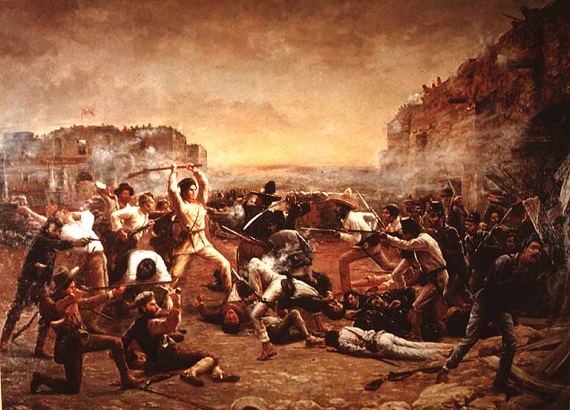T.R. Fehrenbach, author of the magisterial classic Lone Star: A History of Texas and Texans, passed away late last year in San Antonio at the age of 88. I recently came by chance across his obituary in The New York Times, which is a museum quality specimen of the intellectual and ethical defects of current American journalism and “scholarship.”
The article brings up the subject of “myth” in the very first paragraph, as does also the Washington Post obituary. “Myth” is now the fashionable all-inclusive term for any history that records real historical achievements and greatness. For instance, every two-bit historian now dismisses any reference to the heroism of the Confederate struggle for independence as “the Lost Cause Myth.” No matter how actually ignorant he may be about the subject, he asserts this with the confidence of sublime expertise. One alleged historian on the History Channel recently proclaimed that there were no atrocities by Sherman’s army in Georgia and South Carolina in 1864-65, despite literally overwhelming evidence to the contrary. Just another malicious Southern myth it seems.
According to the Times, Fehrenbach “portrayed the state as an almost mythic land, powerfully pleasing many Texans while mightily rankling others.” (Who these “others” are is not made clear. I suspect the only authentic Texans the book really rankled were those who thought it was too critical of their heroic “myth.”) The Post tells us that Fehrenbach’s “vivid writing helped reinforce the heroic mythology surrounding the rise of the Lone Star State.”
One would think that Lone Star was a romantic tale of cowboys and Indians instead of a profound and sweeping history of a sort that has seldom been written in 20th century America. Fehrenbach loved and was proud of his home country, but he wrote no mythology. Rather he wrote a tough and realistic account of a great and large-scale piece of history. A defect of current “scholars” is an incapacity to understand that it is possible to be a patriot and a critical thinker at the same time and that there are in fact heroic achievements in history, even by white men. (Being a patriot and a critic at the same time is a Southern specialty.) Fehrenbach also wrote a highly praised history of the Korean War, in which he served as a volunteer, as he did in World War II. And also a classic history (the only one) of the Comanche people who loom so large in Texas history, and a history of Mexico. In Lone Star he takes a somewhat less than fervently Southern view of Reconstruction. None of this, however, seems to have redeemed him at all in the opinion of the multiculturalists.
Several obscure professors are brought into the obituaries to give us the pseudo-expert official judgment on Fehrenbach’s work. After all, he was unforgivably an independent historian and not a member of the academic caste. That shortcoming probably also proclaims why he was so productive, with more than a dozen books.
Says one professor: “Fehrenbach placed far greater emphasis on white frontiersmen than do today’s historians, who give considerable weight to the roles of women, Mexicans, American Indians, and blacks.” Says another: “We are certainly much more aware of race, class, and gender issues and how they affected people in history.” Yet another learned pundit tells us that Lone Star was a product of its time and bereft of the wisdom of today. It never seems to sink in with the current “scholars” that if Fehrenbach’s work has been outdated by time and progress, then the same thing is likely to happen to their opinions in another generation.
What do these comments tell us? It used to be that two scholars, who were equally learned in the same historical subject, might have a gentlemen’s disagreement over interpretation. But these days one does not have to be an equal in learning to be a dismissive critic of a great historian. All one needs to do is refer to an amorphous and unanchored consensus of historians who agree on an identical opinion. And where does this opinion come from? It is a fashion that requires no serious study or conclusion arrived at by individual intellectual effort. It is a collectivist adherence to a party line that reflects a desire to discredit dissenters. Such is the natural inclination, alas, of the Sixties-reared “scholars” who were taught in elementary school to sit in a circle and hold hands and not to strive, in the previously sacred American way, for achievement and recognition. And always to be solicitous for the feelings of officially designated victim groups, which is far more important than telling an insensitive truth.
Perhaps the final word should be left to Fehrenbach, who said in a 1988 interview: “All the great historians have been great writers. But most of the new ones write small things.”







